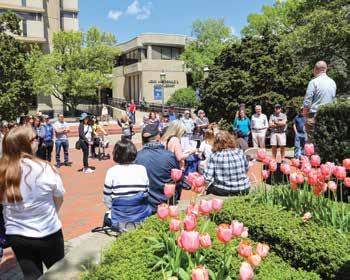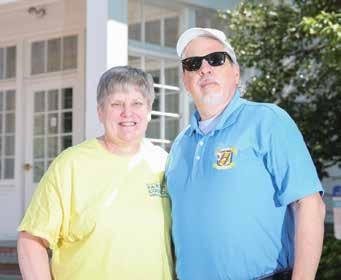
23 minute read
The Summer Before College
Welcome to the Hofstra Pride! This is a very exciting time for you and your family. In this section, we will try to anticipate your questions and potential concerns as you prepare with your student for the fall semester.
What does a usual summer before college look like? While every student is different, we have heard some common stories from parents.
Advertisement
All emails from Hofstra are sent to your student. So, what do you do when your student doesn’t check their email or share Hofstra’s communications with you? What should you say to your student when you see the summer coming slowly but surely to its end, and they are not showing any intention of packing for college? Young people consider this last carefree summer unending and want to enjoy every day of it. They are up late with friends (in person or online), testing curfews and family rules, showing you that they are “independent” and “grown up.” But you may rest assured that they are thinking about their first year of college – sometimes with excitement, sometimes with anxiety; their procrastination may be a symptom of this anxiety.
What should you do?
Be a guide, but empower your student to make their own choices. Ask probing questions, rather than directing. There are several important issues you should discuss; do not fret about details, and bear stoically the mood changes. The following pages list a few topics you should consider discussing with your student.
Academic Expectations
Most students want the same academic success for themselves that their parents wish for them. They want to be excited about learning, and they want to do well in college.
The way you talk with your student about academic expectations depends on what kind of learner they are. You know your student best.
Is your student the first in your family to go to college?
Parent and Family Programs, along with Hofstra’s FirstGeneration Committee members, is here to help students and their families learn how Hofstra works and celebrate your student’s accomplishments! For more information, visit hofstra.edu/firstgeneration
If they are hard workers and are always on top of their work, a simple “I know you will do well” will suffice. If they are more laid-back, perhaps it would be a good idea that you both agree on an acceptable level of academic effort for the first year. Please be aware that the college learning environment is different from high school; the adjustment may result in lower grades than in high school, especially in the first year. Are they working hard for that C, attending every class, submitting work on time, joining study groups, using tutoring services, and visiting the professor during office hours? If so, you should both be proud of their hard work, and encourage your student to meet with their advising dean, or success advisor, who will then work with them to find classes that are a better match for their strengths. But, if your student can’t tell you that they worked as hard as possible, your conversation should focus on resources, motivation, and time management.
To mature into independent adults, your student will need to take responsibility for their own academic choices, including choosing a major and bearing the consequences of those choices. Only if they own those decisions may you count on academic success and personal growth. Students’ grades are not always an indicator of true learning and rich academic experience. Passion for learning and engagement in the intellectual community are important. You may ask your student these questions: What do you hope to accomplish in college? What are you most excited about learning? How do you think high school differs from college?
Later in this handbook, you will learn about the support structure Hofstra offers to your student. You may always call us to ask
Students Who Are Minors
any questions and give us your input about your student. Most of the time, we’ll be able to answer your questions. For us to discuss the details of your student’s records with you, on the other hand, ask your student to complete the FERPA Authorization Form online through the Hofstra portal at my.hofstra.edu (MyAccount).
Money Matters
Paying for college usually represents a commitment from the family, and most students take some financial responsibility for their education. It is very important that your student is aware of all the costs, family finances, and your expectations of what part of the cost they will need to bear. Sitting down with your student and putting all the numbers on paper is a good start. Don’t forget the considerable cost of books, fees, recreation, and transportation.
Be ready to renegotiate the budget as the year progresses. Some students track their monthly expenses so they are aware of what they spend; that way, they can plan and manage their resources better. Students interested in working on campus to support their education are encouraged to visit Hofstra’s Student Employment Office or hofstra.edu/studentemployment to learn about on-campus jobs for students.
Credit cards are convenient and necessary in emergencies. However, credit card companies are aggressive in courting college students, and some students go into unmanageable debt. Please talk with your student about high credit card interest rates and late fees. Also explain how late payments will negatively affect their credit ratings.
Will your student begin the fall semester at 17 years of age or younger? If so, it is very important for them to authorize you for Family eSpace so you are able to complete the Authorization Form - Minor Students. This form is accessible via Family eSpace and must be on file for your student to register for classes and participate in trips and activities.
Students must beware of other choices that can affect finances, such as online gambling, shopping sprees, and eating and traveling off campus. Credit cards may be maxed out easily, and students may find themselves in more debt than they realize.
Finally, if your student is bringing a car to Hofstra, talk with them about insurance and maintenance costs and what part is their responsibility. A good alternative is to enroll in Hofstra’s Zipcar car-sharing program (zipcar.com/hofstra).
Social and Personal Choices
Talk openly and in detail with your student about your values and expectations for their behavior at college. Even though young adults will not happily sit (again) through a conversation about difficult topics such as alcohol and drug use, affirmative consent in sexual relations, healthy relationships, personal safety, and other social choices, your guidance will stay with them. The sudden freedom at college can lead students to forget these responsibilities for themselves and for their college community. Ask your student to read and remember Hofstra’s Code of Community Standards (hofstra.edu/guidetopride), and stress that living and learning in a community carries both privileges and responsibilities.
You have probably been talking to your student about the hazards of alcohol for quite a while. You may not realize it, but students consider parental disapproval of underage drinking as a key reason they choose not to drink (SAMHSA, U.S. Department of Health and Human Services). Reminders of your expectations for the university setting are important. Empower your student with confidence that it is all right to say no and to rely on friends to stay safe during and after events and parties. Please visit hofstra.edu/fo for our guide to approaching difficult conversations.
For students living on campus, there are other adjustments that you should discuss as a family. Living with a roommate may sometimes be a source of frustration, but it is also an opportunity to learn how to negotiate and adapt. Hofstra tries to match roommates with similar habits and interests, but it is inevitable that some roommates may have a hard time getting along. In addition, many new students form an opinion about a future roommate based on a first impression or just by looking at their social media profiles. The key to getting to know a roommate is communication, and this communication should be ongoing and over a period of time. Please remind your student that they cannot discover who their roommate is unless they talk with each other openly and honestly. Listening well and trying to see each other’s point of view will help. Having a roommate who is different from your student will teach new perspectives and enrich your student’s social growth and skills.
Communication
Talking with your student about the method of communication you will use and how often you will communicate with them may help establish healthy boundaries and ensure that you are communicating regularly, while still allowing your student time to acclimate to their new environment. Every student and family is different. While many families communicate daily by phone or text, some students may enjoy receiving the occasional “snail mail” package.
In addition to updates about life on campus, will you expect your student to show you their grades each term? Will they share their credit card statements, so you’ll know they are learning how to manage their finances? Parents often call us to find out how their students are doing in their courses, and our initial questions are: Have you talked to your student, and has your student met with each of their professors and/or advisors? We encourage your student to complete the FERPA Authorization Form for you and each family member to whom they want to give access. Your student should handle issues on their own. However, in emergency situations, FERPA authorization allows you to talk to us abut the details of your student's record. Students can give access to family members by logging in to the Hofstra portal at my.hofstra.edu and selecting MyAccount in the upper right corner.
The Summer-Before Tips for Parents
• Let your student know it is natural to have doubts and to be unsure about their major or how they will adapt to college life. Express trust in your student’s ability to make the right choices when the time comes.
• Don’t overreact to mood changes or seemingly irresponsible behavior. Your student’s anxieties about the first year of college may be the cause.
• You know your student best. If mood changes are excessive and if depression is the prevailing mood, seek the help of professionals. Counseling can help with this big transition.
• Focus on important matters. Talk with your student about four major topics: academic expectations, money matters, social and personal choices, and communication.
• Guide, don’t direct. Rather than expressing your opinion about the best careers or academic choices, ask your student probing questions. When your student owns their decisions, they will grow and mature.
• If your student would benefit from accommodations, we recommend that they register with Student Access Services (hofstra.edu/sas) before the semester begins.
• Protect your investment in your child’s education and look into the Tuition Refund Plan (hofstra.edu/tuitioninsurance).
Ferpa
The Family Educational Rights and Privacy Act (FERPA) of 1974 is a federal law that requires colleges and universities to protect the confidentiality of student education records. The law states that, except in specified circumstances, no one outside the institution shall have access to a student’s education records, nor will the institution disclose any information from those records without the written consent of the student.
What Are Education Records?
“Education records” are records that:
• Contain information that is directly related to a student.
• Are maintained by an education agency or institution or by a party acting for an agency or institution.
What Records Do Not Qualify as Education Records?
• Records that are kept in the sole possession of the maker for use as a memory aid and not shared with others.
• Records created by Public Safety for a law enforcement purpose and maintained by Public Safety.
• Certain employment records that relate exclusively to an individual’s employment capacity. However, Student Employment records are considered education records under FERPA.
• Medical and psychological records made, maintained, or used only in connection with the treatment of the student.
• Post-attendance records (alumni records).
What Are a Student’s Rights Under FERPA?
• Right to inspect and review education records.
• Right to request amendment of education records.
• Right to have some control over the disclosure of information from education records.
• Right to file a complaint with the U.S. Department of Education concerning alleged failures by the education agency or institution to comply with the requirements of the act.
Note: In most circumstances, students do not have the right to review their parents’ financial records or confidential recommendations to which they have waived access
What About Parental Access to a Student’s Education Records?
At the postsecondary level, parents have no inherent rights to inspect a student’s education record. The right to inspect is limited solely to the student. Parents may gain access to nondirectory information (grades, GPA, etc.) only if they obtain consent from the student. The preferred method for students to allow access to parents is by completing the FERPA Authorization Form available through the Hofstra portal, whereby the students can, at their discretion, grant parents access to their entire record or select aspects of their record. A paper version of the FERPA Authorization Form is also available at the Student Financial Services and Registrar Suite, Room 206 Memorial Hall, and can be downloaded at hofstra.edu/arforms
Once authorization is granted, parents may obtain information from the Student Financial Services and Registrar Suite by calling 516-463-8000, visiting Room 206 Memorial Hall, or emailing registrar@hofstra.edu
What Is Considered “Directory Information”?
Hofstra University has designated the following as directory information: the student’s name, address, telephone number, email address, photograph, date and place of birth, major field of study, dates of attendance, grade level, enrollment status (e.g., undergraduate or graduate; full-time or parttime), participation in officially recognized activities and sports, weight and height of members of athletic teams, degrees, honors and awards received, and the most recent education agency or institution attended.
Hofstra University may release appropriately designated “directory information” without the student’s written consent unless the student has advised the University to the contrary in accordance with Hofstra procedures.

If students do not want Hofstra University to disclose directory information from their education records without their prior written consent, they must notify the Office of Academic Records/Registrar in writing. A form requesting nondisclosure may be obtained at the Student Financial Services and Registrar Suite, Room 206 Memorial Hall. Status of nondisclosure is binding until such time that Hofstra is notified in writing by the student to permit release of directory information.
Hofstra University reserves the right to withhold directory information at its discretion.
Can Hofstra University Disclose Information Without a Student’s Consent?
Pursuant to FERPA, the University may disclose a student’s education records without a student’s written consent under certain conditions. These include but are not limited to the following:
• Disclosure to a school official who has a legitimate educational interest.
• Disclosure to an education auditing or enforcing agency of a federal or state-supported program.
• Disclosure associated with eligibility for financial aid.

• Disclosure pursuant to a court order or subpoena.
• Disclosure that is necessary to protect the safety of the student or other persons.
What Is Annual Notification?
In compliance with FERPA, Hofstra University annually notifies students of the rights afforded to them under FERPA by publishing the University’s FERPA policy on the University’s website, in the Undergraduate and Graduate Studies Bulletins, and in the Guide to Pride.
Where Can I Find Additional FERPA Information?

• U.S. Department of Education, Student Privacy Policy Office at studentprivacy.ed.gov
• Hofstra University Office of Academic Records at 516-463-8000 (option 2).
Family Notification
Hofstra University values families as essential partners in guiding our students on their journey toward becoming responsible global citizens. We recognize that students grow and mature when they reflect upon and assume responsibility for their actions and decisions. In accordance with Hofstra’s student-centered philosophy, the University strives to communicate and work with students directly while embracing our partnerships with families.
Hofstra’s Code of Community Standards (hofstra.edu/ guidetopride) establishes expectations for student life, in and out of the classroom, and fosters skill-building in the following areas, among others: critical thinking; independent decision-making; sound judgment; introspection and self-reflection; and logical and ethical reasoning. By giving students autonomy to experience and practice these critical skills, families and the University foster an environment for student growth and development.
In accordance with the Family Educational Rights and Privacy Act (FERPA), the University reserves the right to notify families in emergency situations to protect the health and safety of students or others. This may include instances where a student presents a serious risk of harm to self and/or others; hospitalization or hospital transport; official report of a missing student; or serious mental health concerns. In addition, the University may notify parents of students under age 21 in cases of serious or repeated violations of laws or policies regarding alcohol or other drugs.
Hofstra University recognizes that individual instances guide decisions regarding family notification, depending on the nature and severity of the situation. Although students are encouraged to maintain ongoing communication with their families, the University reserves the right to notify families directly and/or to ensure that they have been satisfactorily informed in circumstances such as those listed above.
University staff will attempt to communicate with the student before contacting a family member in order to discuss the possible benefits and challenges of notification. The vice president for Student Enrollment, Engagement, and Success or designees use professional judgment when determining whether notifying a parent or guardian is essential and benefits student welfare.
Authorizations
Your student may grant you FERPA and Family eSpace authorizations through the Hofstra portal (my.hofstra.edu) under My Account (upper right corner); eBill authorization is separate (see below).
FERPA (Family Educational Rights and Privacy Act of 1974) is a federal law that requires colleges and universities to protect the confidentiality of student education records. Complete information regarding FERPA may be found at hofstra.edu/ferpa. Students may waive their FERPA rights and name a person or persons who will have authorization to communicate with the University regarding financial, academic, advising, conduct, student involvement, and/or residence life records.
Family eSpace is an online portal designed to inform and engage you as a family member. Please complete the My Information form in Family eSpace, so we are aware of your involvement and communication preferences. Parents/ guardians of students aged 17 and younger must complete the Authorization Form - Minor Students. Also in Family eSpace, you will have access to information about Family Orientation, campus events, and the Hofstra University Parent and Family Council, and you can opt into a regional family directory. You will additionally have access to your student’s address, schedule, and final grades if you are FERPAauthorized for that information.
Once you receive an email invitation to join Family eSpace and set up your account, please visit my.hofstra.edu and log in using your authorized email address as your username within 72 hours of receiving the email invitation. For more information about Family eSpace, please visit hofstra.edu/familyespace eBill is Hofstra’s paperless billing system. Students must have at least one authorized user assigned to their eBill account so that the authorized user may also automatically receive emails when electronic billing or other financial statements are available to view and pay bills online. eBill authorization is separate from FERPA and Family eSpace authorizations.
To view your student’s bill (once you receive an email invitation):
1. Visit hofstra.edu/parents
2. Click on the Online Payment Center button.
3. Log in with your authorized email address and password.
4. Click e-Statements at the top of the screen.
5. Select desired statement.
If you have questions about your student’s bill, you can reach a Student Financial Services counselor at sfs@hofstra.edu or 516-463-8000.
The First Year
Parents and family members are often unsure about how to appropriately support their first-year college students. Until now, many parents were expected to make many decisions for their students. Now, parents should want to encourage their college students to solve academic and social issues independently. There may be occasions when parents feel their students are not doing enough or are not informed enough about campus resources. In the following section, we help you anticipate what to expect from your first-year student, explain major milestones of the first academic year, and outline how you may best support them in the first weeks of college.
Above all, always encourage your student to find answers on their own. If the issue is not resolved, please encourage them to go to the Center for University Advising, Room 101 Memorial Hall. Advising deans are great guides for new students. Finally, if you have questions or concerns, call the Dean of Students Office, Parent and Family Programs, at 516-463-4698 or visit us in Room 240 Mack Student Center.
Welcome Day
The day your residential student moves into their residence hall or your commuting student checks in for Welcome Week may be an emotional day, and all the frustrations may be magnified by a true milestone in your lives: Your student is leaving home and starting a new and important stage of life.
To make the separation a little easier, schedule some time to reminisce during the last days of summer: you may, for example, look through old photo albums with your student and celebrate their childhood. Tell them how proud you are of their accomplishments.

Remember there are two common student reactions on Welcome Day, and both are about the stress of the day, not about you. It is common to see students acting rudely or picking fights with their family members. This is their way of asserting new independence, starting the separation process, and acting out their anxieties. Or, students might cry, tell parents that they hate it here, and act clingy. In both cases, try to be patient, know that it will pass (usually by the end of that first evening), and stay strong for your student.
Avoid prolonged, sentimental farewells in front of roommates or fellow students. Say: “I love you. I am proud of you. You are going to be fine.” And know that you will be fine, too.
before, and they need reassurance. The first question you must ask yourself is: Is this just a bad day or is it something more serious? First, listen. And then listen some more. Just by allowing them to talk and vent their frustrations, you are helping. Don’t try to solve their problems. Ask questions and express trust: “I see that this is a big problem for you. Who at Hofstra can help you?” “Have you seen your advising dean or departmental advisor and asked for help?” “I trust you can sort this out.” By finding answers themselves, students will gain confidence that they can make it on their own.
Let your student make the first phone call or send the first text. If you and your student have already agreed on the frequency of communication, the wait will be easier.
Welcome Day is the beginning of Welcome Week, a great program running through Labor Day weekend that helps students acclimate to campus. Commuting and residential students are encouraged to attend all Welcome Week events.

First Weeks
“When the going gets tough, the tough call home” (Savage, 2020). Once the initial excitement is over and the academic workload is apparent, families usually hear from their students, and even then, only if they have complaints about food, roommates, homework, instructors, or advisors. Families worry because they are usually not aware of the many happy moments their students enjoy. In most cases, your students are calling you because they need sympathy; life is harder than
Students may sometimes misuse the flexible nature of the college curriculum. Some professors do not take attendance, so students stop attending classes. This is a big mistake. Remind your student that attendance is the first and necessary step in learning. Professors usually do not cover only what is in the textbook; they elaborate, analyze, probe, and ask for students’ input. Listening and participating in a lecture or lab are essential. Professors are always available to students for advice and mentoring. Students should schedule an office visit with each of their professors one on one early in each semester. That way, professors get to know their students, and students have a better idea if they are on the right track to successfully completing the course. Also, remind your student to visit their advising dean in the Center for University Advising before each registration period every semester.
Socially, this is an exciting and sometimes disappointing time in students’ lives. Students are faced with so many opportunities and so little time. On the other hand, some students freeze when they have to decide which group, club, or activity to join, and become withdrawn. Listen to hear if your student is overwhelmed to the point that it interferes with their normal functioning. Hofstra’s Center for Academic Excellence and Student Counseling Services are wonderful resources that can help with organizing time and making the best personal choices. Say to your student: “I see that you are still trying to figure things out. That is fine. You can always rethink your choices.”
Midsemester
Even in these days of easy electronic communication, residential students love getting mail and packages from their family. Also, students love visits from family members, but when they are announced and not too frequent. The ideal time to visit is Hofstra Fall Festival: Alumni, Student, and Family Weekend, when parents can participate in campus events with their students (hofstra.edu/fw).
Commuting Students
Commuting students sometimes have a difficult time finding their place on campus. For residential students, the physical move to campus represents a tangible rite of passage, an important milestone. Commuting students may somehow feel that going to college does not feel that important or different from high school. Families can help by granting their students greater flexibility in household responsibilities, reflecting their students’ new emerging adult status. In addition, please make a big deal out of your student attending New Student Orientation and the Welcome Week program. During those programs, commuting students will find friends and get to know what activities they can join once the semester starts. It is proven that commuting students who are involved in campus life have a higher rate of academic success than those who are not involved. Also, parents of commuting students are strongly encouraged to participate in Family Orientation; Welcome Day; Hofstra Fall Festival: Alumni, Student, and Family Weekend; and other events on campus. Your participation allows you to show by example that college is very important. Also encourage your commuting student to visit the Office of Commuting Student Services and Community Outreach located in Room 221 Mack Student Center. Visit hofstra.edu/commuting. It is a great resource center that organizes many fun events specifically for commuting students.
Home for the Holidays
Families are often surprised by the change in their students when they come home for the midsemester break, Thanksgiving, or long weekends. The first year is a time of change and growth for students, a time when they experiment, a time when they try to find their identity and place in this world. Often, they come home in clothes of a completely different style than before, or with new habits. They may declare, for example, that they have stopped eating meat and will not, under any circumstances, eat the Thanksgiving turkey and even the stuffing if it is made with animal products. Keep in mind that these changes may not be permanent. Your student is trying on different identities to eventually settle on the best fit.
Also, this may be the time when you hear about “strange” courses your students are taking. You ask yourself: “Why are they learning about hip-hop?” “What relevance could this anthropology course have for their career?” Hofstra’s rigorous liberal arts education exposes students to a wide range of subjects and fields. The aim in all courses, though, is to teach students a most important lesson: how to think and write critically. These skills, along with many others that students will gain through our broad curriculum, are invaluable in any career, since today’s workforce must be flexible and able to adapt.
You may also hear that, for example, your student, who had been planning to pursue a medical career since childhood, suddenly discovered the joys and intellectual challenges of art history and may not want to be a pre-med student any longer. Even though you have told all your relatives about your budding doctor, you must let your student make that important decision about their major. You may again ask your student questions: “What is it that attracts you to this field?” “Do you know what career opportunities exist in this field?” “Have you consulted with the Center for Career Design and Development for a career assessment session to help you decide on your major?”
A major does not automatically determine a future career. Always support your student in finding out more information about a field, but please allow them to freely express their doubts in front of you and make their own decisions.
Times You Might Worry
By the fourth week of school, your student should be talking about coursework, academic challenges, and new friends. Both commuting and residential students should be making connections on campus. If your student continues to talk exclusively about friends from home, or if the conversation is only about the social life on campus, it is time for a talk about educational goals again. Ask your student about their academic plans: Have they seen their academic advisor? Are they attending classes? Also, repeat those questions at the beginning of the spring semester. Please urge them to visit the Center for University Advising in Room 101 Memorial Hall or call 516-463-6770. The earlier problems are noticed, the easier it is to correct them.
If you see a dramatic change in your student’s mood for a prolonged period of time, please encourage them to visit Student Counseling Services. Located in Hofstra’s Wellness and Campus Living Center on North Campus, Student Counseling Services may be reached at 516-463-2273. The experienced staff is there to help students who are having difficulty managing emotional, behavioral, and/or academic goals. The counselors maintain strict confidentiality but will always accept a parent call with your input.
If you suspect any emergency related to a medical, psychological, or safety situation, please call (or ask your student to call) Public Safety at 516-463-6789. In addition, let Parent and Family Programs know if there is a situation at home that might affect your student. If we know of an illness, death, divorce, or crisis, we can offer your student additional support. However, be sure to tell your student that you called us. When we are on the same team and don’t hide anything, students are more open to our help.
If you are not sure whether to worry, call the Office of Parent and Family Programs at 516-463-4698 or email parents@hofstra.edu, and we will help you sort it out.
Adjustment for Parents
This may be the first time you and your student have lived apart. It is all right to feel anxious and disoriented. Allow yourself time to adjust. Adjusting to the “empty nest” may be difficult, especially in the first week or two, even if you still have other children at home. Feeling a sense of loss is natural. Don’t let needless worry take over. You may not believe it in the beginning, but it will get better. This is a great opportunity for you to grow and change along with your student. You may find yourself with extra time to spend with your partner, travel, or participate in activities long-planned but put aside. Celebrate your new freedom and your student’s independence. In time, you will learn how to relate to your student in a different way, still be involved positively in their life, and know when their calls warrant your action. If you would like to read more about transition, look for these books:
Froh, Jeffrey, & Bono, Giacomo. 2014. Making Grateful Kids: The Science of Building Character. Templeton Press.
Hazard, Laurie L., & Carter, Stephanie K. 2016. Your Freshman is Off to College: A Month-by-Month Guide to the First Year. CreateSpace Independent Publishing.

Hefferman, Lisa, & Harrington, Mary Dell. 2019. Grown and Flown, How to Support Your Teen, Stay Close as a Family, and Raise Independent Adults. Flatiron Books.
Kami, Gilmour. 2017. Release My Grip: Hope for a Parent’s Heart as Kids Leave the Nest and Learn to Fly. Group Publishing, Inc.
Morris, Marcia. 2018. The Campus Cure: A Parent’s Guide to Mental Health and Wellness for College Students. Rowman & Littlefield.
Petree, Chelsea et al. 2022. College Ready 2022: Expert Advice for Parents to Simplify the College Transition. Wise Action.
Savage, Marjorie. 2020. You’re on Your Own (But I’m Here If You Need Me): Mentoring Your Child During the College Years. Fireside.
During your student’s time at Hofstra, get involved in campus life by visiting, attending various seminars or lectures, volunteering at events, and/or writing articles for our parent blog. To learn about events, services, and deadlines, subscribe to our monthly e-newsletter, Family Link, at hofstra.edu/familylink. You, parents and families, are also members of the Hofstra Pride!
First-Year Tips for Parents

Be an anchor.
• Listen to your student carefully and with an open mind.
• Try to curb your anxieties. Don’t give advice when your worries take over.
• Ask open-ended questions. Discuss difficult topics such as alcohol and drug abuse as well as how to prevent sexual violence. Bringing up current events may help facilitate these important discussions. See page 43 for more information.
• Keep conversations positive and avoid small arguments.
• Encourage your student to find resources on campus.
• Share stories from home and news from your family; don’t just interrogate your student.
• Keep in touch; email, write, and send care packages.
• Visit, but not too often. Announce your visits.
• Keep your student informed of major changes at home.
• You know your student best. Make a move when you feel something is truly amiss. Call Parent and Family Programs at 516-463-4698.
Friday, September 29-Sunday, October 1, 2023
Please visit hofstra.edu/fw for information.




